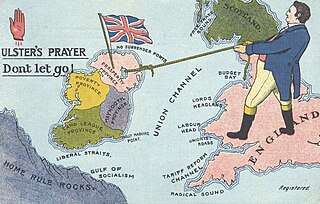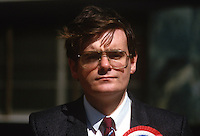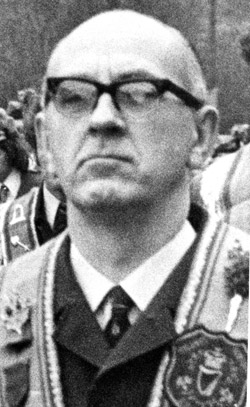Related Research Articles

The Ulster Unionist Party (UUP) is a unionist political party in Northern Ireland. The party was founded as the Ulster Unionist Council in 1905, emerging from the Irish Unionist Alliance in Ulster. Under Edward Carson, it led unionist opposition to the Irish Home Rule movement. Following the partition of Ireland, it was the governing party of Northern Ireland between 1921 and 1972. It was supported by most unionist voters throughout the conflict known as the Troubles, during which time it was often referred to as the Official Unionist Party (OUP).

Northern Ireland is one of the four countries of the United Kingdom, situated in the north-east of the island of Ireland. It was created as a separate legal entity on 3 May 1921, under the Government of Ireland Act 1920. The new autonomous Northern Ireland was formed from six of the nine counties of Ulster: four counties with unionist majorities – Antrim, Armagh, Down, and Londonderry – and two counties with slight Irish nationalist majorities – Fermanagh and Tyrone – in the 1918 General Election. The remaining three Ulster counties with larger nationalist majorities were not included. In large part unionists, at least in the north-east, supported its creation while nationalists were opposed.

Unionism is a political tradition on the island of Ireland that favours political union with Great Britain and professes loyalty to the British Crown and constitution. As the overwhelming sentiment of Ireland's Protestant minority, following Catholic Emancipation (1829) unionism mobilised to keep Ireland part of the United Kingdom and to defeat the efforts of Irish nationalists to restore a separate Irish parliament. Since Partition (1921), as Ulster Unionism its goal has been to maintain Northern Ireland as part of the United Kingdom and to resist a transfer of sovereignty to an all-Ireland republic. Within the framework of a 1998 peace settlement, unionists in Northern Ireland have had to accommodate Irish nationalists in a devolved government, while continuing to rely on the link with Britain to secure their cultural and economic interests.

Terence Marne O'Neill, Baron O'Neill of the Maine, PC (NI), was the fourth prime minister of Northern Ireland and leader (1963–1969) of the Ulster Unionist Party (UUP). A moderate unionist, who sought to reconcile the sectarian divisions in Northern Ireland society, he was a member of the Parliament of Northern Ireland for the Bannside constituency from 1946 until his resignation in January 1970; his successor in the House of Commons of Northern Ireland was Ian Paisley, while control of the UUP also passed to more hard-line elements.

James Henry Molyneaux, Baron Molyneaux of Killead, KBE, PC was a Northern Irish unionist politician who served as leader of the Ulster Unionist Party (UUP) from 1979 to 1995, and as the Member of Parliament (MP) for South Antrim from 1970 to 1983, and later Lagan Valley from 1983 to 1997. An Orangeman, he was also Sovereign Grand Master of the Royal Black Institution from 1971 to 1995, and a leading member of the Conservative Monday Club.

David Ervine was a Northern Irish Ulster Loyalist politician who served as leader of the Progressive Unionist Party (PUP) from 2002 to 2007, and was also a Member of the Northern Ireland Assembly (MLA) for Belfast East from 1998 to 2007. During his youth Ervine was a member of the Ulster Volunteer Force (UVF) and was imprisoned for possessing bomb-making equipment. Whilst in jail he became convinced of the benefits of a more political approach for Ulster loyalism and became involved with the PUP. As a leading PUP figure, Ervine helped to deliver the loyalist ceasefire of 1994.

The Vanguard Unionist Progressive Party (VUPP), informally known as Ulster Vanguard, was a unionist political party which existed in Northern Ireland between 1972 and 1978. Led by William Craig, the party emerged from a split in the Ulster Unionist Party (UUP) and was closely affiliated with several loyalist paramilitary groups. The party was set up in opposition to power sharing with Irish nationalist parties. It opposed the Sunningdale Agreement and was involved in extra-parliamentary activity against the agreement. However, in 1975, during discussions on the constitutional status of Northern Ireland in the constitutional convention, William Craig suggested the possibility of voluntary power sharing with the nationalist Social Democratic and Labour Party. In consequence the party split, with dissenters forming the United Ulster Unionist Party. Thereafter Vanguard declined and following poor results in the 1977 local government elections, Craig merged the remainder of Vanguard into the UUP in February 1978.

The Irish Unionist Alliance (IUA), also known as the Irish Unionist Party, Irish Unionists or simply the Unionists, was a unionist political party founded in Ireland in 1891 from a merger of the Irish Conservative Party and the Irish Loyal and Patriotic Union to oppose plans for home rule for Ireland within the United Kingdom of Great Britain and Ireland. The party was led for much of its existence by Colonel Edward James Saunderson and later by William St John Brodrick, Earl of Midleton. In total, eighty-six members of the House of Lords affiliated themselves with the Irish Unionist Alliance, although its broader membership among Irish voters was relatively small.

Robert Jonathan Bradford was a Methodist Minister and a Vanguard Unionist and Ulster Unionist Member of Parliament for the Belfast South constituency in Northern Ireland until his assassination by the Provisional Irish Republican Army (IRA) on 14 November 1981.

Ulster loyalism is a strand of Ulster unionism associated with working class Ulster Protestants in Northern Ireland. Like other unionists, loyalists support the continued existence of Northern Ireland within the United Kingdom, and oppose a united Ireland independent of the UK. Unlike other strands of unionism, loyalism has been described as an ethnic nationalism of Ulster Protestants and "a variation of British nationalism". Loyalists are often said to have a conditional loyalty to the British state so long as it defends their interests. They see themselves as loyal primarily to the Protestant British monarchy rather than to British governments and institutions, while Garret FitzGerald argued they are loyal to 'Ulster' over 'the Union'. A small minority of loyalists have called for an independent Ulster Protestant state, believing they cannot rely on British governments to support them. The term 'loyalism' is usually associated with paramilitarism.

George Seawright was a Scottish-born unionist politician in Northern Ireland and loyalist paramilitary in the Ulster Volunteer Force. He was assassinated by the Irish People's Liberation Organisation in 1987.

The Loyal Orange Institution, commonly known as the Orange Order, is an international fraternal movement based in Northern Ireland and primarily associated with Ulster Protestants (it also has lodges in England, Scotland and the Republic of Ireland, as well as in parts of the Commonwealth of Nations and the United States. Most of the organization's lodges are located in Ireland, England, and Scotland, although others can be found throughout the British Commonwealth, including Canada, Australia, New Zealand and Africa. The lodges of every country are independent, but the Orange Order meets in a triennial world council.}}</ref> The Orange Order was founded by Ulster Protestants in County Armagh in 1795, during a period of Protestant–Catholic sectarian conflict, as a fraternity sworn to maintain the Protestant Ascendancy in Ireland. It is headed by the Grand Orange Lodge of Ireland, established in 1798. Its name is a tribute to the Dutch-born Protestant king William of Orange, who defeated Catholic king James II in the Williamite–Jacobite War. The order is best known for its yearly marches, the biggest of which are held on or around 12 July, a public holiday in Northern Ireland
The Commonwealth Labour Party (CWLP) was a minor political party in Northern Ireland. The party was founded in 1942 by Harry Midgley, former leader of the Northern Ireland Labour Party (NILP), in order to pursue his brand of labour unionism.

Ulster Resistance (UR), or the Ulster Resistance Movement (URM), is an Ulster loyalist paramilitary movement established by the Democratic Unionist Party (DUP) in Northern Ireland in November 1986 in opposition to the Anglo-Irish Agreement.
Tara was an Ulster loyalist movement in Northern Ireland that espoused a brand of evangelical Protestantism. Preaching a hard-line and somewhat esoteric brand of loyalism, Tara enjoyed some influence in the late 1960s before declining amid a high-profile sex abuse scandal involving its leader William McGrath.
The Ulster Protestant League (UPL) was an anti-Catholic supremacist loyalist organisation in Northern Ireland.
The Orange Institution, better known as the Orange Order, is a Protestant fraternal organisation based in Northern Ireland. It has been a strong supporter of Irish unionism and has had close links with the Ulster Unionist Party, which governed Northern Ireland from 1922 to 1972. The Institution has lodges throughout Ireland, although it is strongest in the North. There are also branches throughout the British Commonwealth, and in the United States. In the 20th century, the Institution went into sharp decline outside Northern Ireland and County Donegal. Observers have accused the Orange Institution of being a sectarian organisation, due to its goals and its exclusion of Roman Catholics and close relatives of Catholics as members. The Order has a substantial fraternal and benevolent component.

William McGrath was a loyalist from Northern Ireland who founded the far-right organisation Tara in the 1960s, having also been prominent in the Orange Order until his expulsion due to his paedophilia. A house master in Kincora Boys' Home in East Belfast, in 1981 he was jailed for four years for paedophile activities at the Home.
Clifford Peeples is a self-styled pastor in Northern Ireland who has been associated with Ulster loyalist activity. Peeples has been a member of the Ulster Volunteer Force (UVF), the Loyalist Volunteer Force (LVF) prisoners' spokesman and leader of the Orange Volunteers. He has taken a prominent role in opposing the Northern Ireland Protocol in the courts.

The Young Citizen Volunteers of Ireland, or Young Citizen Volunteers (YCV) for short, was a British civic organisation founded in Belfast in 1912 which later became the youth wing of Ulster loyalist paramilitary group the Ulster Volunteer Force. It was established to bridge the gap for 18 to 25 year olds between membership of youth organisations—such as the Boys' Brigade and Boy Scouts—and the period of responsible adulthood. Another impetus for its creation was the failure of the British government to extend the legislation for the Territorial Force—introduced in 1908—to Ireland. It was hoped that the War Office would absorb the YCV into the Territorial Force, however such offers were dismissed. Not until the outbreak of World War I did the YCV—by then a battalion of the UVF—become part of the British Army as the 14th Battalion of the Royal Irish Rifles.
References
- ↑ Moriarty, Gerry (31 May 2016). "Inquiry told of British state 'collusion' in sex abuse at Belfast boys' home" . The Irish Times .
- 1 2 3 4 BBC NI - Eyewitness
- ↑ Review of Garland's 'Seeking a Political Accommodation - The Ulster Volunteer Force: Negotiating History'
- ↑ Chris Ryder, The RUC: A Force Under Fire
- ↑ "Four write in opposition to Tory link-up". Belfast Telegraph . 24 October 2009.